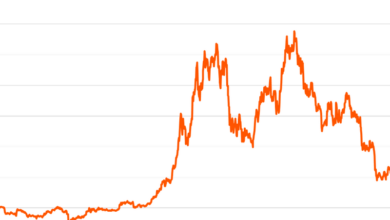Has Warren Buffett Lost His Touch?
Has Warren Buffett lost his touch? That’s the question swirling around the investing world lately, and it’s a fascinating one. For decades, Buffett was synonymous with unparalleled success, a legend built on shrewd investments and a seemingly unerring ability to pick winning stocks. But recent performance hasn’t been quite as stellar, prompting many to wonder if the Oracle of Omaha’s magic has faded.
This post delves into the complexities of Buffett’s recent investment decisions, exploring the shifting market landscape and the potential impact of age and succession planning.
We’ll examine Buffett’s recent investment returns, comparing them to his historical performance and analyzing his largest holdings. We’ll also look at how the rise of technology and other macroeconomic factors might be influencing his strategies. Finally, we’ll consider alternative investment approaches and whether they might be better suited to today’s market. It’s a complex picture, and there’s no easy answer, but let’s dive in and explore the evidence together.
Changes in the Market Landscape
Warren Buffett’s legendary success was built on a foundation of value investing in a significantly different market landscape than the one we see today. His early triumphs were largely in a world dominated by industrial giants and predictable, slower-moving economies. The market of the 21st century presents a dramatically altered playing field, demanding adaptation and a re-evaluation of traditional strategies.The investment landscape has undergone a seismic shift since Buffett’s early years.
Is Warren Buffett’s legendary investing prowess fading? Some argue his recent performance reflects a changing market, but I wonder if it’s also tied to larger forces at play. The influence of unchecked wealth, as detailed in this article on current elitist threats to our republic , might be distorting the economic landscape, making it harder for even the Oracle of Omaha to consistently pick winners.
Ultimately, whether he’s lost his touch or just facing unprecedented challenges remains a fascinating question.
Technological advancements have revolutionized communication, information access, and trading speed, creating a hyper-reactive market. Globalization has interconnected economies in unprecedented ways, increasing both opportunities and risks. Furthermore, regulatory environments have become increasingly complex, with stricter rules and greater scrutiny of corporate behavior. These changes have fundamentally reshaped market dynamics, impacting valuation methodologies and the types of companies that thrive.
Comparison of Buffett’s Traditional Favored Companies and Dominant Companies Today
Buffett’s investment philosophy historically centered on identifying undervalued, fundamentally sound companies with strong competitive advantages and consistent earnings. These companies often had tangible assets, predictable cash flows, and a long track record of success. However, the dominant companies of today often operate in sectors that are vastly different.
So, the question on everyone’s mind: has Warren Buffett lost his touch? It’s a complex issue, and honestly, sometimes I feel like I’m grasping at straws trying to figure it out. It’s a bit like that whole Don Lemon situation – I read this article about a guy who witnessed something and initially made light of it, man says he witnessed cnn host don lemons alleged assault i was kind of making fun i feel bad now , and now he regrets it.
Similarly, maybe we’re all too quick to judge Buffett’s recent moves. Maybe time will tell.
- Traditional Buffett Investments: Companies like Coca-Cola, American Express, and Gillette were characterized by their strong brands, durable competitive moats, and predictable cash flows. They were typically established, mature businesses with a long history of profitability.
- Dominant Companies Today: The current market leaders are frequently technology companies like Apple, Google (Alphabet), Microsoft, and Amazon. These companies are characterized by rapid innovation, high growth potential, and often intangible assets such as intellectual property and brand recognition. Their business models can be more complex and their future earnings less predictable than those of the traditional companies Buffett favored.
So, is Warren Buffett’s magic fading? It’s a question many are asking, especially given the recent market volatility. It makes you think about other unexpected shifts, like the news that former democrat congresswoman Tulsi Gabbard leaving party , a move that also surprised many. Perhaps these events highlight the unpredictability of both the financial world and the political landscape, leaving us wondering if even the most seasoned experts are struggling to keep up.
Buffett’s future success, like Gabbard’s political path, remains to be seen.
Impact of Technology Companies on Buffett’s Investment Strategy
The rise of technology companies and the explosive growth of the tech sector present both opportunities and challenges for Buffett’s investment strategy. While some technology companies exhibit characteristics that align with Buffett’s value investing principles – strong brands, large market share, and significant cash flows – many others operate in rapidly evolving markets with high levels of uncertainty and competition.
The intangible nature of many tech assets also makes valuation more complex and potentially more subjective.For example, the meteoric rise of companies like Amazon and its impact on traditional retail has significantly altered the landscape for many established businesses. While Buffett has made some investments in the tech sector, his approach remains cautious. He has expressed concerns about the challenges in accurately valuing companies whose primary assets are intangible and whose future growth is highly dependent on rapid technological innovation and shifts in consumer behavior.
This caution highlights the need for adaptation in the face of evolving market conditions. The speed and scale of disruption in the technology sector require a more dynamic approach than that which served Buffett so well in the past. The sheer complexity of some tech business models also presents a significant challenge to his traditional methods of fundamental analysis.
Buffett’s Age and Succession Planning
Warren Buffett’s advanced age is a legitimate concern for Berkshire Hathaway investors. At 92, his influence on the company’s investment strategy is undeniable, and questions about his eventual successor and the future direction of the conglomerate are increasingly prominent. While Buffett has built a legacy of remarkable success, the impact of his age and the transition of power are crucial factors to consider in assessing Berkshire Hathaway’s long-term prospects.The potential influence of Buffett’s age on his decision-making and investment approach is subtle but potentially significant.
While his mental acuity remains sharp, the sheer physical demands of running a company as vast as Berkshire Hathaway might naturally lead to a gradual shift in responsibilities and perhaps a slightly more cautious investment strategy. This isn’t necessarily a negative; a more measured approach might be beneficial in certain market conditions. However, it’s important to acknowledge the possibility of a reduced risk appetite compared to his more aggressive investment strategies in his younger years.
Berkshire Hathaway’s Succession Plan and its Potential Impact
Berkshire Hathaway’s succession plan centers around a two-person team: Greg Abel, who heads the non-insurance operations, and Ajit Jain, who oversees the insurance businesses. While Buffett has indicated his preference for Abel to eventually succeed him as CEO, the specifics of the transition remain somewhat fluid. A change in leadership could lead to shifts in investment strategy, although the extent of these changes is debatable.
Abel, for example, has a reputation for operational efficiency and a focus on long-term value creation, aligning with Buffett’s overall philosophy but potentially emphasizing different aspects of the business. The impact of a transition will likely be gradual, with a period of collaboration and knowledge transfer before a complete shift in leadership style. A key factor will be the maintenance of Berkshire’s unique decentralized structure and its culture of long-term investment.
The transition’s success hinges on the chosen successor’s ability to maintain investor confidence and navigate the complexities of the diverse businesses under Berkshire’s umbrella.
Potential Successors and Their Investment Philosophies, Has warren buffett lost his touch
Greg Abel’s background in operational management and his long tenure at Berkshire Hathaway suggest a pragmatic approach to investment. His focus might be on improving operational efficiency within Berkshire’s subsidiaries, potentially leading to a more focused acquisition strategy compared to Buffett’s historically broader approach. Ajit Jain, with his deep expertise in insurance underwriting, brings a different perspective. His investment philosophy is likely to be informed by risk management and the long-term stability of insurance portfolios.
While both individuals have extensive experience within Berkshire Hathaway, their specific investment philosophies may differ subtly from Buffett’s, potentially leading to changes in the types of companies acquired and the overall investment portfolio composition. This is not necessarily a negative; it represents an evolution, and the ability of these individuals to adapt and innovate will be key to the continued success of Berkshire Hathaway.
Macroeconomic Factors and Their Impact: Has Warren Buffett Lost His Touch
Warren Buffett’s legendary investment success has been inextricably linked to the macroeconomic environment. While his long-term approach often transcends short-term market fluctuations, recent years have presented a unique set of challenges stemming from significant shifts in global economic conditions. Understanding these shifts is crucial to analyzing his recent performance and comparing it to his earlier triumphs.The macroeconomic landscape of the past decade differs significantly from the one Buffett navigated during his most prolific years.
The relatively stable, low-inflation environment of the 1980s and 1990s contrasts sharply with the volatile period marked by rising interest rates, persistent inflation, and geopolitical uncertainty that has characterized recent times. This section will explore how these factors have impacted Buffett’s investment decisions and outcomes.
Interest Rate Changes and Their Influence on Investment Strategies
The Federal Reserve’s aggressive interest rate hikes in response to inflation have profoundly impacted the investment environment. Higher interest rates increase the cost of borrowing, impacting corporate investment and potentially slowing economic growth. This affects Buffett’s investment choices, as higher rates make fixed-income securities more attractive relative to equities, while also increasing the hurdle rate for potential acquisitions.
For example, the increased cost of debt financing might make a large acquisition less appealing, even if the underlying business is fundamentally sound. Conversely, during periods of low interest rates, like those seen in the aftermath of the 2008 financial crisis, Buffett and Berkshire Hathaway could more easily leverage debt to finance acquisitions.
Inflation’s Impact on Valuation and Investment Returns
Persistent inflation erodes the purchasing power of money and directly impacts the valuation of assets. Companies face increased costs, which can squeeze profit margins if they can’t pass those costs on to consumers. High inflation also makes it challenging to accurately predict future cash flows, a crucial element in Buffett’s valuation framework. For instance, the rising cost of raw materials and labor could significantly affect the profitability of companies in Buffett’s portfolio, leading to a re-evaluation of their intrinsic value.
In contrast, during periods of low or stable inflation, valuations were more predictable, simplifying the process of identifying undervalued assets.
Geopolitical Events and Their Unpredictability
Geopolitical events, such as the war in Ukraine and escalating US-China tensions, introduce significant uncertainty into the global economy. These events can disrupt supply chains, increase commodity prices, and trigger market volatility. Such instability makes it more challenging for investors like Buffett to accurately assess risks and make informed investment decisions. The unpredictability inherent in geopolitical risks necessitates a more cautious approach, potentially limiting investment opportunities or requiring a greater emphasis on downside protection.
Compare this to earlier periods where geopolitical risks were arguably less pervasive and predictable, allowing for more aggressive investment strategies.
Comparison of Key Economic Indicators Across Different Time Periods
| Indicator | 1980s-1990s (Approximate) | 2010s-2020s (Approximate) |
|---|---|---|
| Average Inflation Rate (US) | Low, relatively stable (around 3-4%) | Higher and more volatile (ranging from near zero to over 8%) |
| Average Interest Rates (US 10-year Treasury) | Relatively high initially, declining over time | Historically low initially, significantly increased recently |
| Geopolitical Stability | Relatively stable, with some regional conflicts | Increased geopolitical tensions and uncertainty |
| Global Economic Growth | Strong, sustained growth in many developed economies | More uneven growth, periods of slowdowns and uncertainty |
So, has Warren Buffett truly lost his touch? The answer, it seems, is far from simple. While his recent performance hasn’t mirrored his legendary past, it’s premature to declare his reign over. The evolving market landscape, macroeconomic shifts, and the inevitable impact of age all play significant roles. His legacy remains undeniable, but the question of whether he can continue to adapt and thrive in a rapidly changing world remains a captivating one to watch unfold.
Ultimately, only time will tell if the Oracle can maintain his legendary status in the years to come.





